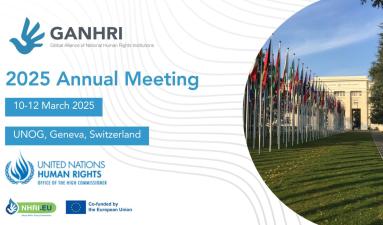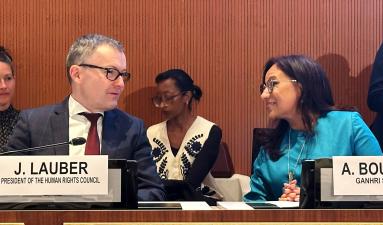
The National Human Rights Council (CNDH) welcomes the adoption of a significant resolution on “Women, Diplomacy, and Human Rights” by the United Nations Human Rights Council (UNHRC) at its 58th session. Initiated by the Kingdom of Morocco and backed by a diverse cross-regional group—Chile, the Maldives, Mauritius, Mexico, Slovenia, and Spain—this resolution marks a pivotal moment in promoting women's representation in diplomacy and multilateral platforms.
Ms. Amina Bouayach, CNDH Chairperson and recently elected President of the Global Alliance of National Human Rights Institutions (GANHRI), affirmed that the resolution reflects a collective commitment renewed by women’s participation in decision-making and their full, equal, and safe contribution to international diplomacy.
“Women’s participation in diplomacy is not only a legitimate right but a necessity to ensure the comprehensive protection of human rights,” said Bouayach at the International Day of Women in Diplomacy celebrated in Geneva in June 2024. She further underscored the importance of recognizing the contributions of women diplomats and dismantling structural barriers preventing women from assuming leadership roles in international organizations.
This new resolution, according to Ms. Bouayach, is not only an additional step toward advancing gender equality—thirty years after the Beijing Declaration and Platform for Action—but also an official recognition of the historic and symbolic efforts made by pioneering women in diplomacy around the world. The resolution points out the underrepresentation of women in diplomacy and multilateral forums, despite international commitments. It also sheds light on the urgent need for systemic change, as called for by human rights bodies including the CNDH, to ensure fair and effective participation of women in global decision-making.
The CNDH also welcomes the resolution’s support to institutionalize the International Day of Women in Diplomacy as an essential annual occasion to honor women’s contributions and dedication to peace, equality, international cooperation, and human rights, while also opening renewed global dialogue on gender-based obstacles within the field.
Thanks to their deep experiences in facing discrimination and violence, women have contributed to shaping international human rights frameworks, including foundational texts such as the Universal Declaration of Human Rights. The CNDH affirms that women’s leadership not only strengthens UN institutions but also contributes to building inclusive and just societies.
Excerpt from the CNDH Chairperson's statement at the celebration of the International Day of Women in Diplomacy, Geneva, June 2024.
In this context, the CNDH reiterates its call to all national and international partners to intensify efforts to break the "glass ceiling" that hinders women’s access to decision-making positions. Underrepresentation is not merely a matter of representation—it deprives international action of vital opportunities to integrate women’s perspectives in shaping global policies and decisions.
As a National Human Rights Institution with leadership roles at regional, continental, and international levels, the CNDH reaffirms its unwavering commitment to advocating for and supporting all initiatives that advance women’s participation in diplomacy and multilateral forums as a lever to strengthen human rights and consolidate peace and sustainable development around the world.









